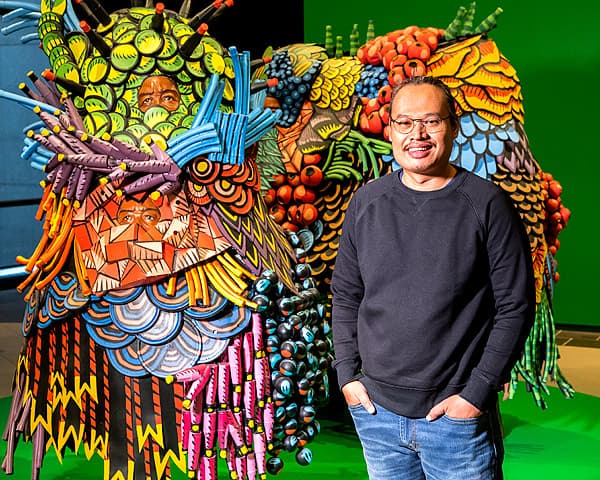Contemporary
worlds
Indonesia
Eko Nugroho
Belonging to a younger generation of artists who emerged post-Reformasi—known as generation 2000 or the internet generation—Eko Nugroho witnessed the rapid social and political changes that followed the fall of Suharto’s 32-year rule. Working primarily with popular culture imagery—street art, comic books and science fiction—seamlessly woven together with traditional Javanese motifs from batik and wayang (shadow puppets), Nugroho has developed hybrid pop-figures that embody the attitude of this period. These figures appear prominently in his underground comic zine, Daging Tumbuh (DGTMB), which was initiated in 2000 in collaboration with other artists in the spirit of the newly won democracy. More recently, these figures have found new surfaces as the artist playfully experiments with different media—sculpture, embroidery, mural painting, contemporary wayang kulit performance and installation. Nugroho’s multidisciplinary practice has grown from a central objective: to find public space, in any shape or form, to share his art.
Combining sculpture, installation and batik, Carnival trap 2018 features brightly coloured costumes concealing all but the faces and feet of the figures beneath. Made of upcycled plastic debris collected in Yogyakarta, the work addresses Nugroho’s concerns regarding Indonesia’s plastic predicament that affects the entire archipelago. This not only situates the artist in a local conversation but is a comment on the wider global issues of waste management and land pollution. Conceptually, this work likens Indonesia’s current political situation to a carnival, charged with colourful lights, roaring noise and a seemingly collective euphoria. However, Nugroho’s work is a cautionary message on the hype often created by politicians, inviting us to be critical and to look beyond this misleading masked festivity.
The artist’s distinctive embroidery works also connect to greater socio-political issues pertinent to everyday life in Indonesia. Throw away peace in the garden 2018 and We keep it as hope, no more no less 2018 compare Indonesia’s democracy to a garden where politics, religion and culture are tangled like branches, vines and wildflowers. Embroidery holds a unique and important place in Nugroho’s oeuvre, and has led him to establish a business in support of Yogyakarta’s community of embroiderers.
Nugroho’s practice is rooted in the realities of his local community but has an astute global outlook. Evident in his multifaceted practice, the artist presents an awareness of the complexities and dilemmas of contemporary life in an increasingly interconnected world.
Bianca Winataputri

Eko Nugroho
